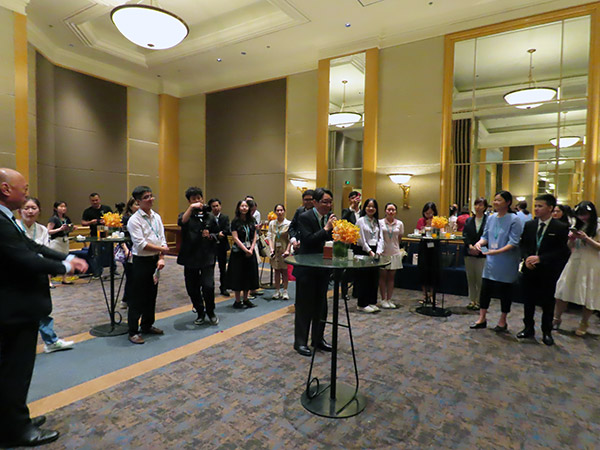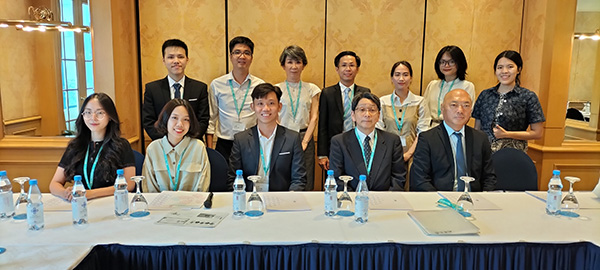Events
Positive Prospects and Outlook Shared Under SSCV Event Theme “Future Us”
On May 27, 2023, the 3rd Sakura Science Club Vietnam (SSCV) Alumni Meeting “Future Us: Motivation and Development” was held at the Hanoi Daewoo Hotel in Vietnam. Co-hosted by Sakura Science Club in Vietnam (SSCV) and the Japan Science and Technology Agency (JST), 77 attendees gathered at the venue. The event highlighted numerous ties being built between Vietnam, Japan and the world. In the process, Sakura Science Program (SSP) is playing a vital role as a vehicle of exchange and has helped in accelerating collaboration at various educational levels. We could see that the alumni members attending the event are potential innovators who will make a difference in our future. The event was co-moderated by SSCV coordinators Ms. Mai Ngan Giang and Mr. Vu Nguyen Quang Duy who are both enrolled at Japan Vietnam University (JVU).

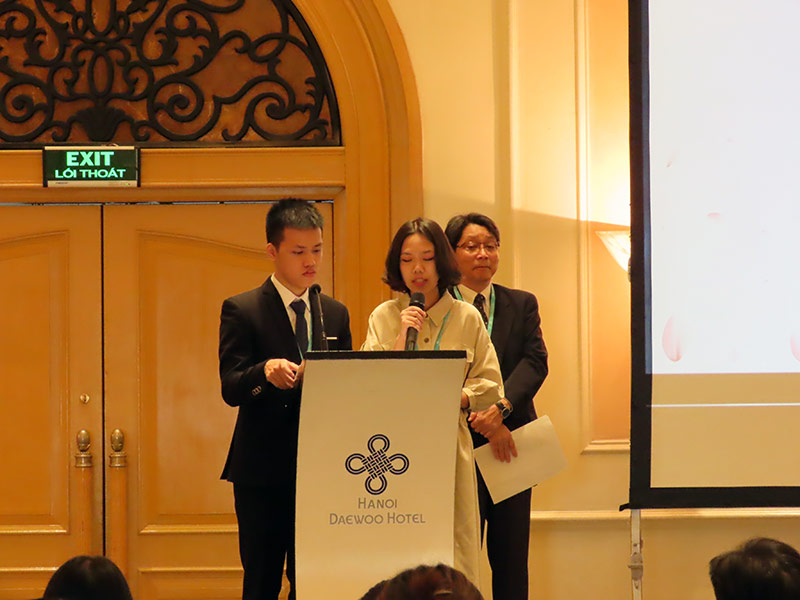
Part 1 “Opening and Keynote Session”
Mr. Lam Quoc Hiep, President of Sakura Science Club Vietnam (SSCV), opened the meeting by looking back on SSCV’s history. The first meeting took place in Hanoi in March 2019, while the second was conducted online in September 2021 due to the COVID-19 pandemic. Through the forward-looking event theme, "Future Us: Motivation and Development," Mr. Lam Quoc Hiep encouraged attendees to consider future ambitions and how they can contribute to progress and development. He called on the alumni not to take the occasion for granted, but to “take this opportunity to renew ourselves, to look forward to the wonderful and ambitious future.”
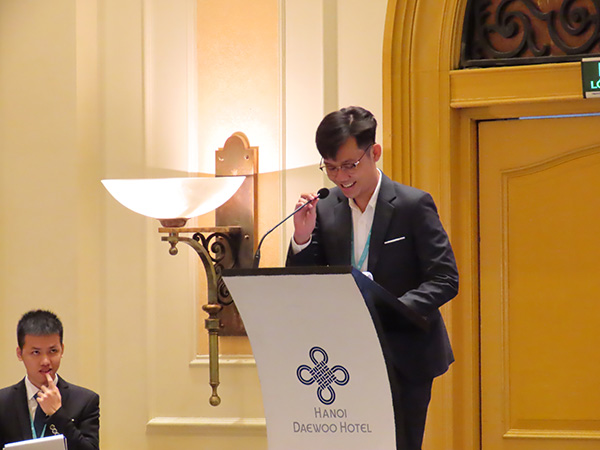
President
Sakura Science Club in Vietnam (SSCV)
As the co-host, Mr. ITO Sotaro, Deputy Director-General of the Sakura Science Program Headquarters at Japan Science and Technology Agency (JST), warmly welcomed the guests, reflecting on the achievements of SSP since its birth in 2014. Out of 36,000 youths JST invited from different parts of the world, more than 2,600 talented participants are from Vietnam. He praised the volunteer efforts of all alumni groups for developing valuable networks in and outside of their home countries and pledged to support Sakura Science Club Vietnam (SSCV), so that members can remain connected with Japan.
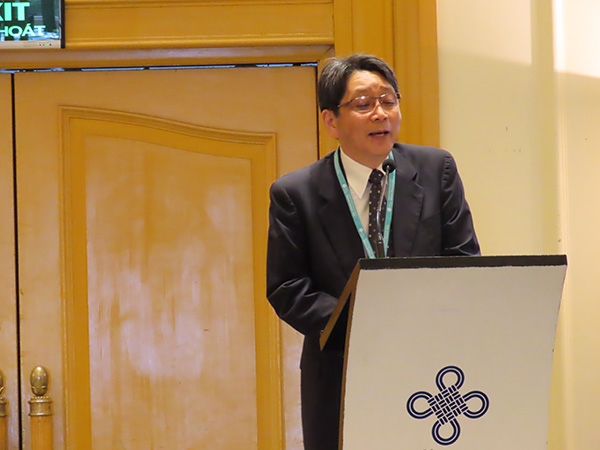
Sakura Science Program Headquarters
Japan Science and Technology Agency (JST)
With a celebratory “xin chào!”, Mr. TAKEBE Arata, a member of the House of Representatives in Japan and Deputy Director General of the Japan-Vietnam Parliamentary Friendship Association, gave congratulatory remarks through his video message. He first noted the 50th anniversary of diplomatic relations between the two countries and stressed the importance of people-to-people exchange, particularly among youth. He then praised the opportunities SSP has provided. He expressed confidence that these exchanges “have cultivated mutual understanding and goodwill between the people of our two countries.”
Ms. KAMITANI Naoko, Director of the Japan Information and Culture Center at the Embassy of Japan in Vietnam, expressed her joy at being able to meet everyone in person─a nice change from online meetings. Because the Vietnamese government had made “science, technology, and innovation as one of its most important policies as a driving force for sustainable development,” she expressed her hope that the alumni will play a leading role in the growth of these fields in Vietnam. In conclusion, she wished for the continuous development of SSP and Sakura Science Club (SSC), its alumni network.
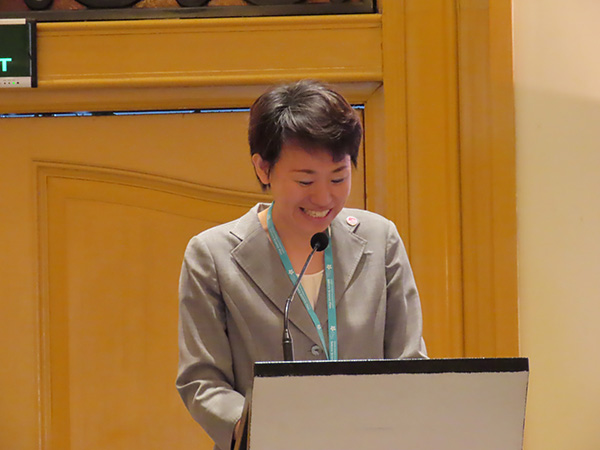
Director, Japan Information and Culture Center
Embassy of Japan in Vietnam
Following Ms. Kamitani’s speech, honorable guests and coordinators were invited to the stage for a series of commemorative photos.
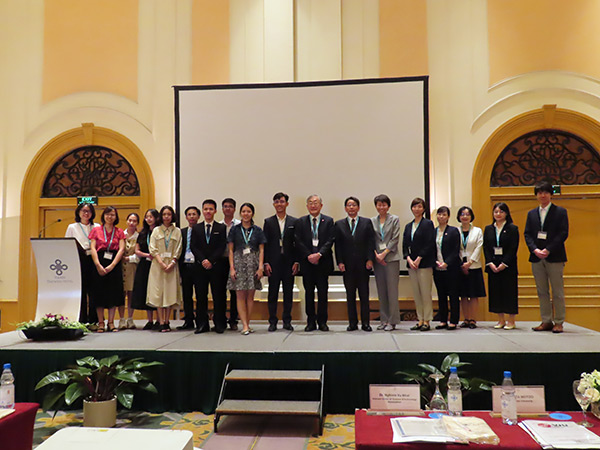
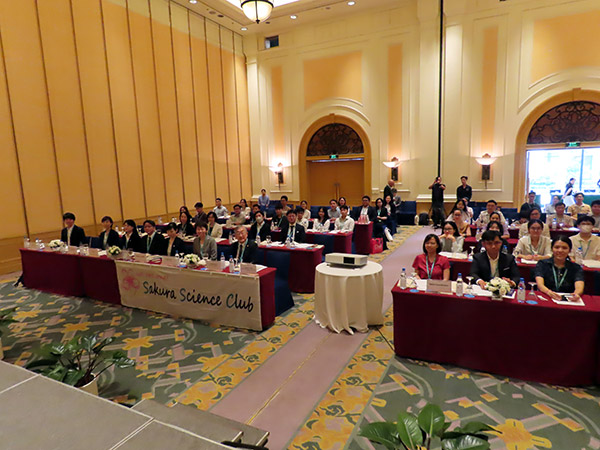
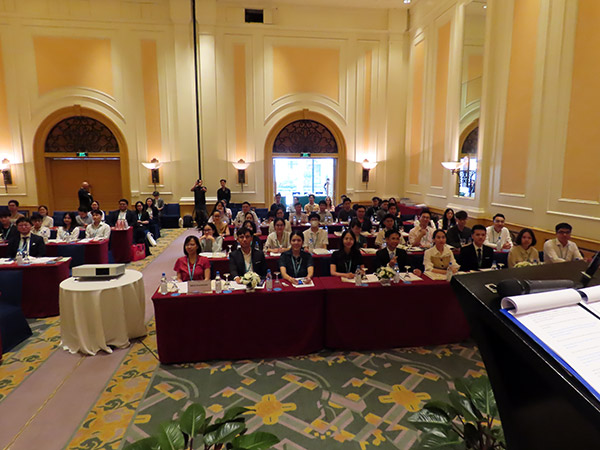
In his keynote presentation titled “Japan’s Contribution to Higher Education in Vietnam,” Dr. FURUTA Motoo, the Rector of Vietnam Japan University (VJU) detailed the journey of VJU from its inception in 2009 to its opening in 2016. He spoke about its growth, challenges, core principles, aspirations, and future plans, and affirmed that VJU was dedicated to becoming “a leading research university in the field of Sustainability Science in Asia” and to “cultivating individuals who contribute to the friendly relations between Vietnam and Japan.”
VJU currently offers eight master’s programs, including Environmental Engineering, Nanotechnology, Civil Engineering, and Climate Change & Development, and six undergraduate programs, including Japanese Studies, Computer Science, Smart Agriculture & Sustainability, Civil Engineering, Food Engineering & Health, and Mechatronics & Japanese Manufacturing.
Dr. Furuta then spoke about the university's cooperation agreement with Minamata City, site of a catastrophic environmental disaster in the mid-20th century. In 2017, directors of the Minamata Environmental Academia’s Research Promotion Project visited VJU, and a graduate student from VJU’s Public Policy Program was subsequently accepted as a trainee in Minamata. Starting from 2018, this training program continued under SSP, and in 2020, “an SSP online exchange was initiated between VJU and Minamata High School.”
VJU students thus have a unique opportunity to learn from Minamata's history and revitalization efforts. Students can gain crucial insights from studying the city's efforts to overcome environmental disaster, its ecological movements, and its current initiatives to revitalize Minamata Bay. Dr. Furuta concluded by underscoring the importance of SSC and its alumni in fostering ongoing exchange between Japan and Vietnam.
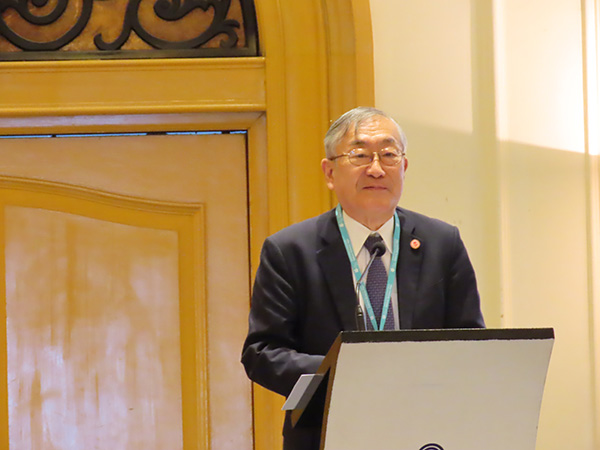
Vietnam Japan University (VJU)
After the keynote session, Ms. Vu Minh Hanh, from the Japan Student Services Organization (JASSO) Vietnam Office, gave a detailed presentation on “Postgraduate Study in Japan”. She emphasized the vital role of finding a “supervisor" professor in order to be accepted at a postgraduate institution. She offered strategies for finding one, such as direct contact, school websites, academic forums, or even through embassy channels. In any case, putting work into crafting and communicating a research plan to your potential supervisor is essential, and Ms. Minh Hanh detailed various strategies for accomplishing this.
In regard to scholarship opportunities, Ms. Minh Hanh showcased the prestigious MEXT (Japan Government) Scholarship and JASSO Scholarships. She also introduced other scholarship options and directed attendees to studyinjapan.go.jp, the official website managed by JASSO.
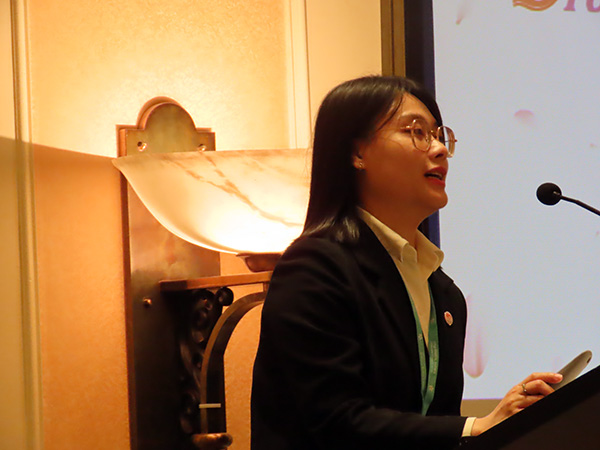
Japan Student Services Organization (JASSO) Vietnam Office
Next, Ms. KATSUMATA Mihoko, Associate Professor at the Joining and Welding Research Institute of Osaka University (OU), started off by expressing her gratitude towards SSP for facilitating the study of 113 Vietnamese students at OU since 2014.
Ms. Katsumata introduced OU’s historical roots anchored in Kaitokudo, a school for merchants, and Tekijuku, a Dutch-based medicine school. Evolving into one of Japan's nine imperial universities, it later merged with Osaka University of Foreign Studies in 2007.
Within its three campuses located in the north side of Osaka, OU provides 11 undergraduate schools, 15 graduate schools, 25 research facilities, and two university hospitals. There are approximately 23,000 students enrolled at Osaka University, with over 10% being international students.
Then Ms. Katsumata gave an overview of the graduate programs offered in English. Prospective graduate students were advised to first identify their preferred supervisor and lab. The university offers assistance in this important task through its Admissions Assistance Desk. It is important to do this early, at least 6-12 months before the application deadline.
She also shared details about her own institute, the Joining and Welding Research Institute (JWRI), a unique institution in Japan focusing solely on the area of joining and welding. The institute includes cutting-edge facilities for materials testing. JWRI had recently established a joint research hub inside Hanoi University of Science and Technology, marking an expansion of their research activities into Vietnam and potentially other ASEAN regions. Ms. Katsumata works in this branch institute herself, and welcomed visits from interested attendees.
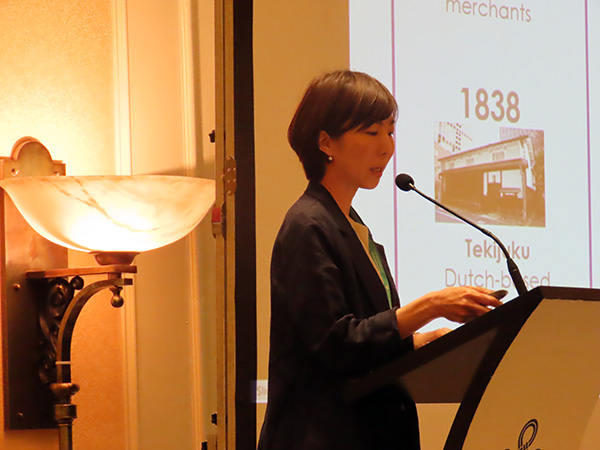
Joining and Welding Research Institute, Osaka University
Part 2 "Sharing Session from SSCV Members"
After the tea break, one of the current SSCV coordinators, Ms. Minh Hang Duong, took the stage to express her gratitude towards JST for their extraordinary efforts in advancing science and technology. She also emphasized the immense appreciation the SSCV team holds for the former coordinators’ work. As she surveyed the audience, Ms. Minh Hang Duong noted the presence of numerous young, energetic individuals who she identified as potential future coordinators for SSC. She expressed her hope that this event would inspire these young minds to join the coordinators’ team in the forthcoming years.
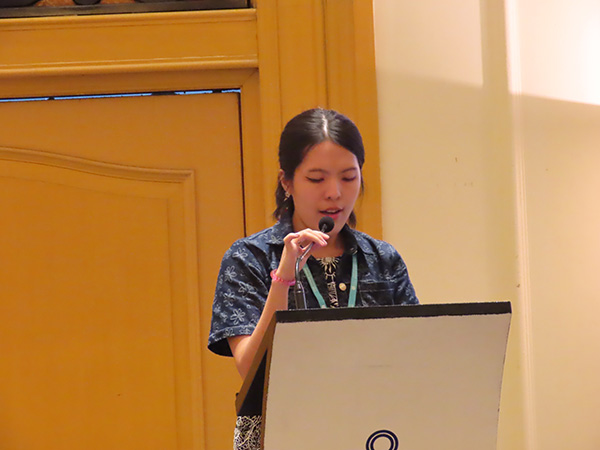
SSCV Coordinator
Quiz Session
The new coordinators then hosted an ice-breaker in the form of a fun quiz game. Attendees logged into Quizizz.com on their smartphones and competed against each other to answer ten questions.
The questions ranged from questions about Japanese culture to historical facts about Vietnamese-Japanese relations, the time difference between the two countries, and details about the Sakura Science Program (“What is the maximum age to join Sakura Science?”).
The final question asked participants “What is the number of SSC members in Vietnam now?” A mathematical hint was provided: 12𝑥22𝑥112𝑥5. Participants raced to calculate the answer before time was up! Can you solve the problem??
The scores were tallied, and the five participants with the highest scores were invited to the stage to receive their well-earned prizes.
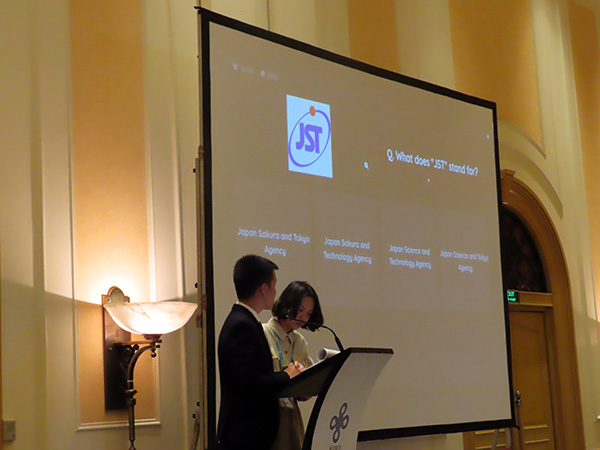
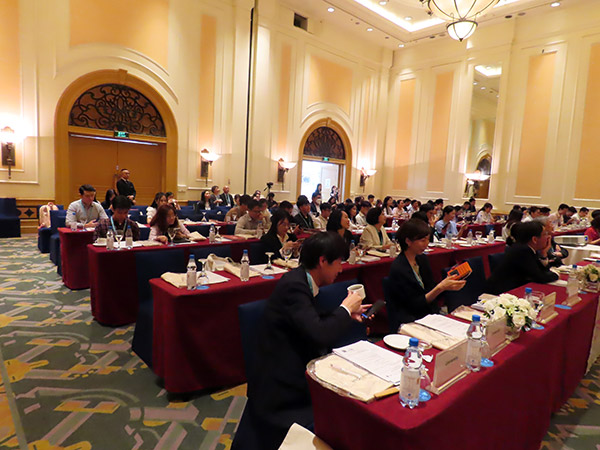
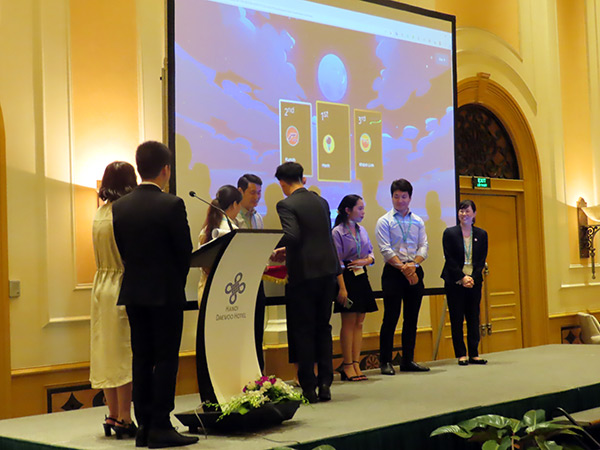
Photo Contest Results
Following the quiz session, Ms. ISHIHARA Mari, the program coordinator of Sakura Science Club Headquarters at JST, announced the winners of an SSCV photo contest held as part of this alumni event. A total of 32 entries were submitted, and out of these submissions, five exceptional entries were selected. The winners were: Ms. Nguyen Trang Tran; Ms. Ngat Duong; Mr. Quang Duong Minh; Ms. Truc Pham Ngoc Thanh and Mr. Luu Gia Hy. The winners were invited to the stage to receive their prizes, which were presented by Mr. Ito Sotaro. The award certificate and prize were mailed to Mr. Luu Gia Hy because he could not come to the venue this time. You can view the compilation of all photos here.
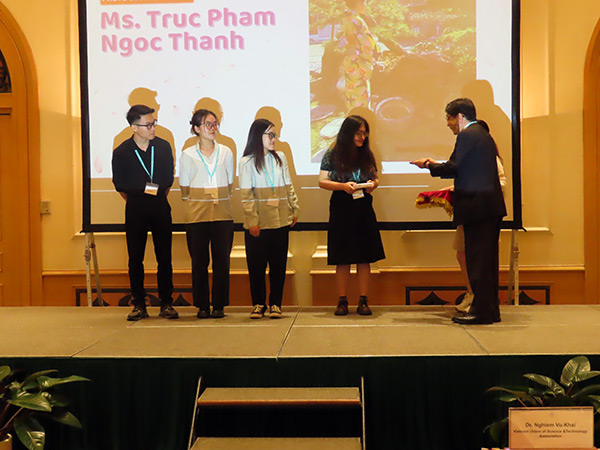
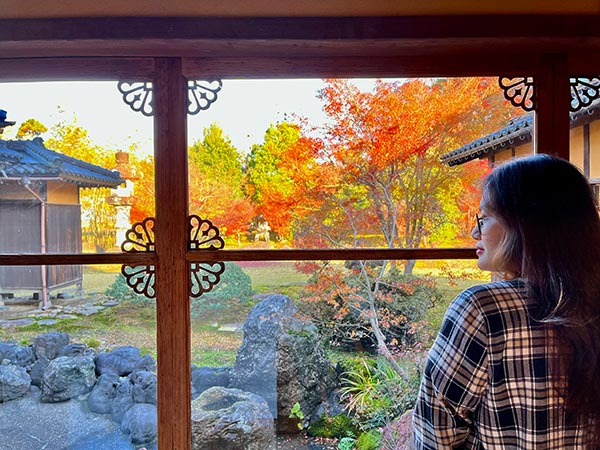
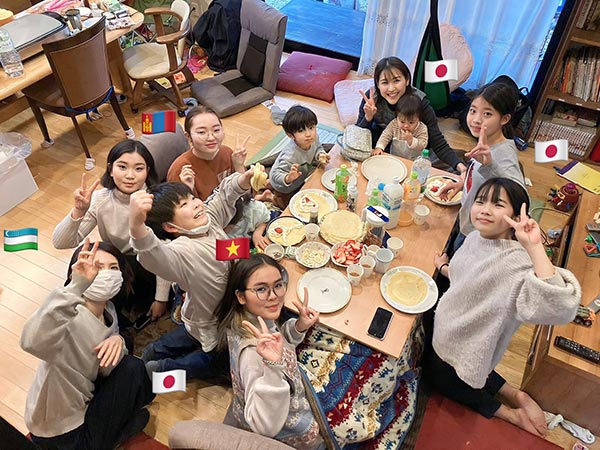
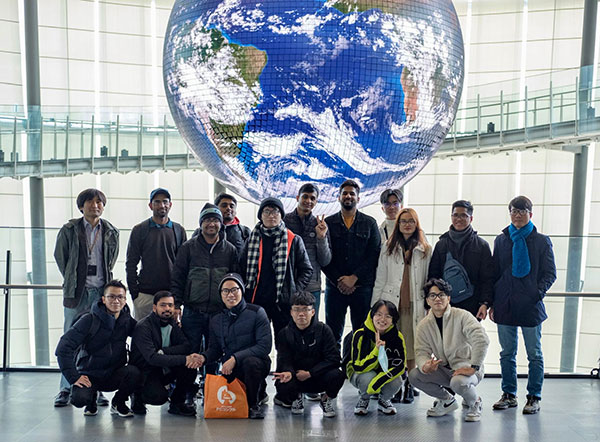
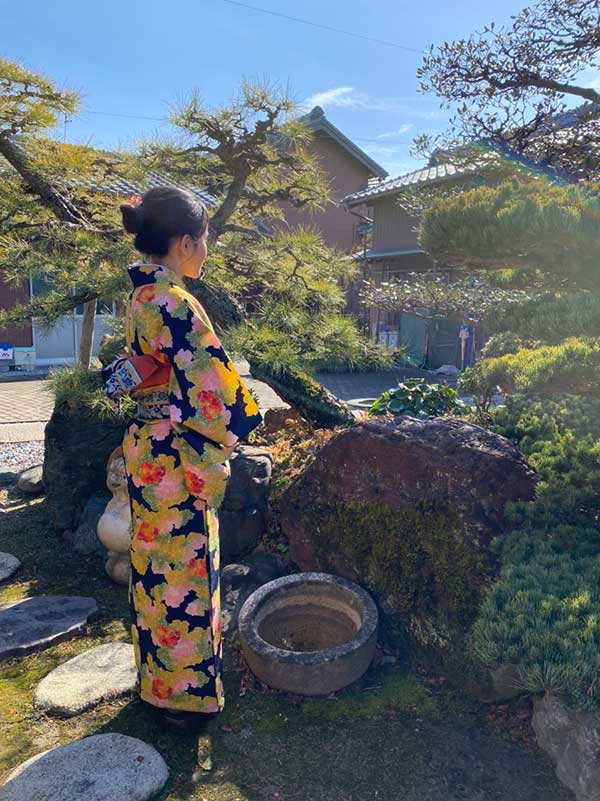
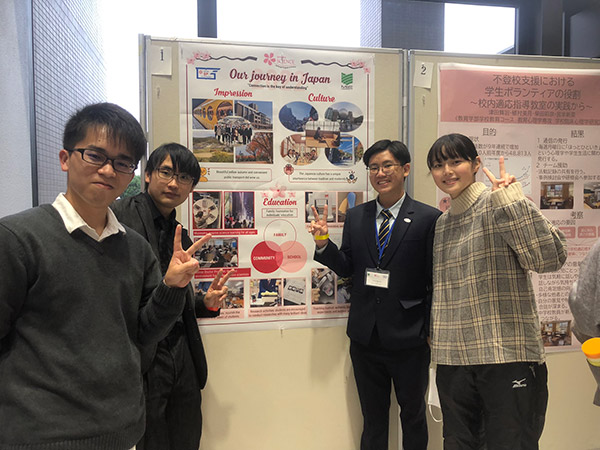
Special Guest Speaker
As someone who studied and worked in Japan, Dr. Pham Thi Nu, a former JST SSP Program Coordinator and JST research fellow, talked about her experience in Japan. Recalling her journey, she first mentioned the Asian Science Fellowship─ a seven-month intensive program for students to study in Japan. She remembered the rigorous schedule, studying Japanese daily from 9 a.m. to 4 p.m., memorizing about 60 new words every day, and completing beginner and intermediate levels in three short months.
After the Fellowship, she went on to study at Yokohama National University (YNU), where she majored in Physics and studied engineering. She had the opportunity to join the K-computer project, working under the supervision of Professor Ohno. She obtained her Ph.D. while raising three children.
Wrapping up her speech, Dr. Pham Thi Nu encouraged the attendees to consider Japan for studying, working, and gaining new experiences. She urged them not to hesitate communication, not to be afraid of failure, and to make the most of their time.
"After many failures, I realized that failure is not a terrible thing. It's just an experience. When you make a mistake, you can learn a lot from it. So, don't be afraid of failure,” she concluded.
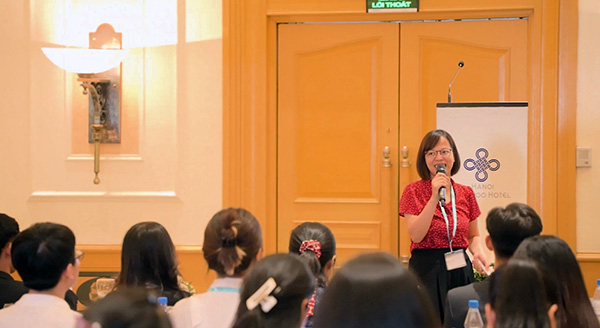
Former JST SSP Program Coordinator
JST Research Fellow
Presentation by SSCV Members
Ms. Mai Ngan Giang, a first-year student at Vietnam Japan University (VJU), was the first speaker. A first-year student at Vietnam Japan University (VJU), she spoke briefly about her experience with the Sakura Science Club and Minamata City. Due to the COVID-19 pandemic, her program with Minamata was conducted online, but this did not dampen her educational journey. She is passionate about sustainable development. Her involvement with SSC holds particular significance for her as it was her first activity at VJU, “so it held quite an important place in my heart.” She expressed her excitement at now serving as a coordinator for SSCV. She expressed her enthusiasm and aspiration to contribute to future activities.
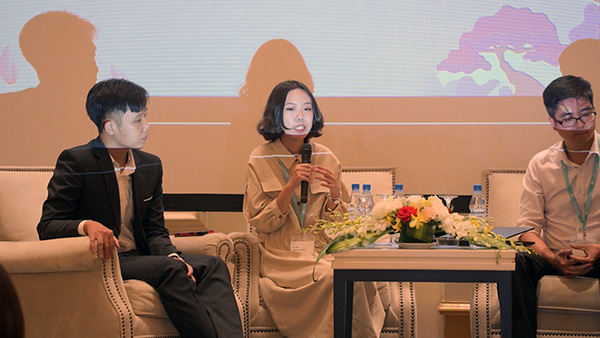
The second speaker was Mr. Lam Quoc Hiep, a third-year student at Ho Chi Minh City College of Economics and the new President of SSCV. Mr. Quoc Hiep spent seven days at Kanazawa Institute of Technology (KIT) in Ishikawa Prefecture. He found himself in a diverse group of students from Japan, Vietnam, Indonesia, and Singapore. Their mission was to use "design thinking" to propose solutions to help travel agencies rebound after the pandemic. As he faced cultural differences, among the four countries, the mission was not without its challenges. Nevertheless, he found the silver lining in his interactions with the kind teachers and staff at KIT, which made him feel at home. Concluding his speech, Mr. Lam Quoc Hiep recognized SSP as a source of motivation for his personal development, linking it to the theme of the event: "Motivation and Development." His transformative experience shows the impact that international programs can have on individual growth and cross-cultural understanding.
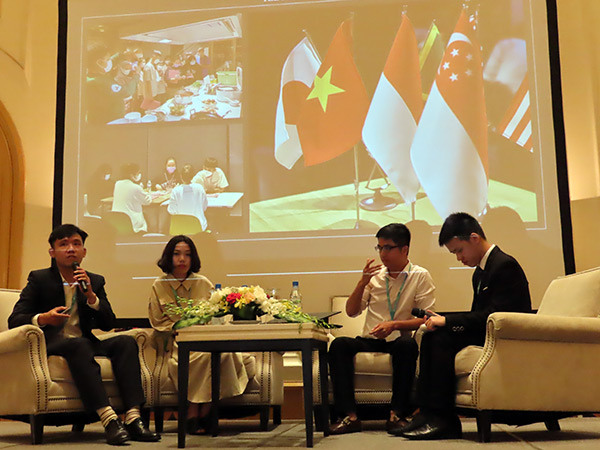
Finally, Mr. Bui Nam, an MA IT Engineer at Ninh Binh General Hospital, delivered a comprehensive presentation about his learning experiences in Japan through SSP. He first shared information about his workplace, Ninh Binh General Hospital, which collaborates with Japanese doctors for the treatment of cleft palate in children. However, this cooperation was suspended in 2020 due to the COVID-19 pandemic, though it hopes to resume soon.
Mr. Bui Nam worked with teammates from various countries, including India, Indonesia, Malaysia, Nepal, Bhutan, and Vietnam, and learned about modern telemedicine equipment at the TEMDEC Telemedicine Center of Kyushu University. This included training in the setup of telemedicine systems, utilizing VR technology in endoscopy, and controlling teleconferences with medical professionals from different countries.
In addition to the academic pursuits, the team also engaged in cultural activities, such as visiting Hiroshima Peace Memorial Museum and world heritage site Miyajima, as well as learning to cook local food.
Reflecting on the impact of SSP, he pointed out several positive effects. It helped improve his English skills and offered exposure to Japanese lifestyle and work culture. It also instilled a deeper understanding of environmental preservation and professional ethics. He plans to apply the skills and knowledge acquired during the program to his work at Ninh Binh General Hospital and aims to recommend potential candidates to join the program in the future.
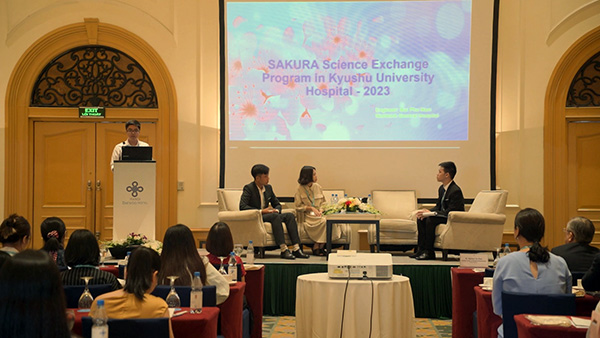
After the sharing session, all guests and attendees moved to the next banquet room for a buffet meal and casual socializing. Mr. ITO Sotaro gave the closing remarks and reminded the alumni that this event “serves as the first step to strengthen relationship among all SSCV alumni.” The secretariat in Japan would like to thank all honorable guests, guest keynote speakers, SSCV coordinators and members for commemorating the new start of SSCV. You can view the after-event member interviews here.
